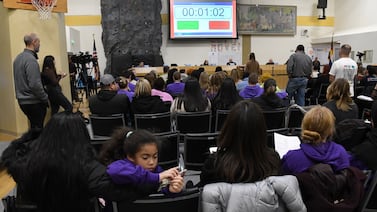Sign up for Chalkbeat Detroit’s free daily newsletter to keep up with the city’s public school system and Michigan education policy.
The Detroit school district made good on a December threat to sue the state over what Superintendent Nikolai Vitti has described as an erroneous interpretation of the law by the treasury department that could be costly for the district and taxpayers in the city.
The Detroit Public Schools Community District filed the lawsuit Dec. 20 in the Michigan Court of Claims against the Michigan Department of Treasury and State Treasurer Rachael Eubanks after months of discussions between the district and department. The move comes after Vitti said during a Dec. 10 school board meeting that a lawsuit was likely the best outcome for the district.
It’s a complicated case that involves revenue from an operating millage and a 2016 legislative deal that established DPSCD while leaving the old Detroit Public Schools intact to collect tax revenue and pay off debt that was racked up during a couple of decades of mostly state control of DPS. The bottom line, though, is that a resolution would either clarify the flexibility the district has to pay debt, or lead to more costs for the district.
Here’s what you need to know about the case:
Revenue from an 18-mill operating millage has been used to pay off the operating debt of DPS. Because property values have risen in the city, the district has been able to accelerate those payments, and the debt will be paid off by February of this year, according to the lawsuit. That’s 18 months ahead of schedule.
District officials had planned to use the operating millage revenue to pay off its remaining debt: It has $355 million in debt to the state School Loan Revolving Fund and another $1.3 billion in capital debt. It is currently using a debt millage to pay off those debts, and it is estimated both would be paid off by 2040. However, the plan to use both the debt millage revenue and operating millage revenue would accelerate the payment, and the debt would be retired within eight years, the lawsuit says.
According to the lawsuit, the Treasury department contends: That the operating millage revenue can’t be used to pay off the capital and revolving fund debt; that once the operating millage is paid off in February, DPS can no longer levy the operating millage; and that since the DPS operating millage would end, DPSCD would have to ask voters to approve an operating millage.
An election for a DPSCD operating millage would have to be held in May, and the district would have to cover the full costs of that election.
The Treasury’s stance would also mean the state would no longer fully fund the district’s operational costs and instead a mix of operating millage and state funding would have to cover those costs, as they do for other districts in Michigan. The state began covering DPSCD’s operational costs after the 2016 legislative deal.
The Treasury’s position means it would take longer to pay off the outstanding debt, which would mean more than $300 million in additional interest costs, the lawsuit contends. And if voters reject an election to establish an operating millage for DPSCD, it could affect the district’s ability to provide adequate programming for students.
The district contends that the Treasury department is misinterpreting state law. The lawsuit asks a judge to issue a preliminary and permanent injunction that would make it clear the district can use the operating millage to pay non-operating debt, and that the state is required to continue paying the DPSCD operating costs.
“Treasury is willing to sacrifice the financial stability of [DPSCD], and by extension the quality of education for students enrolled there, simply because it no longer wants to pay what State law requires it to pay,” the lawsuit states.
Officials from the Treasury department didn’t comment specifically on the lawsuit in a statement Friday in which they reiterated what they told Chalkbeat in December — that they are working with the district “to ensure a quality education is provided to the children of Detroit.”
Vitti did not immediately respond to a request for comment Friday. But he told Chalkbeat Dec. 11, the day after a meeting in which he spoke at length about the issue, that he would not be making further public comments.
Lori Higgins is the bureau chief for Chalkbeat Detroit. You can reach her at lhiggins@chalkbeat.org.






